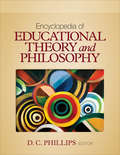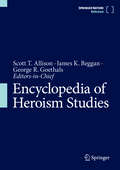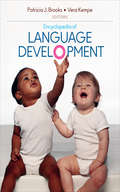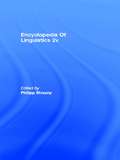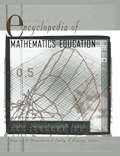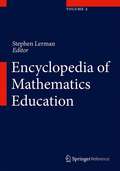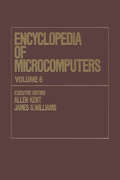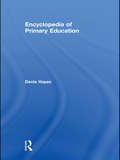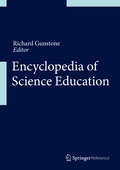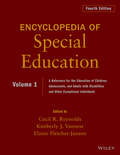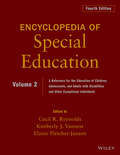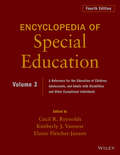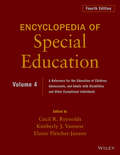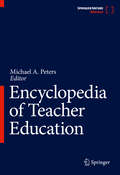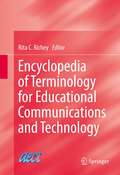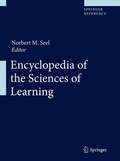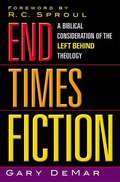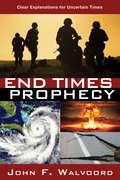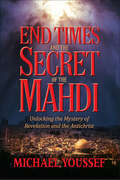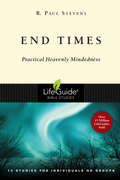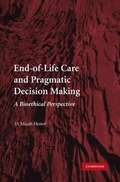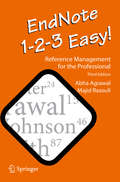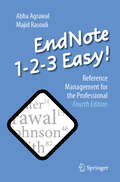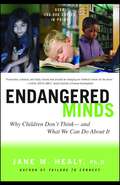- Table View
- List View
Encyclopedia of Educational Theory and Philosophy
by Professor D. C. PhillipsEducation is a field sometimes beset by theories-of-the-day and with easy panaceas that overpromise the degree to which they can alleviate pressing educational problems. The two-volume Encyclopedia of Educational Theory and Philosophy introduces readers to theories that have stood the test of time and those that have provided the historical foundation for the best of contemporary educational theory and practice. Drawing together a team of international scholars, this invaluable reference examines the global landscape of all the key theories and the theorists behind them and presents them in the context needed to understand their strengths and weaknesses. In addition to interpretations of long-established theories, this work offers essays on cutting-edge research and concise, to-the-point definitions of key concepts, ideas, schools, and figures. Features: Over 300 signed entries by trusted experts in the field are organized into two volumes and overseen by a distinguished General Editor and an international Editorial Board. Entries are followed by cross references and further reading suggestions. A Chronology of Theory within the field of education highlights developments over the centuries; a Reader’s Guide groups entries thematically, and a master Bibliography facilitates further study. The Reader’s Guide, detailed index, and cross references combine for strong search-and-browse capabilities in the electronic version. Available in a choice of print or electronic formats, Encyclopedia of Educational Theory and Philosophy is an ideal reference for anyone interested in the roots of contemporary educational theory.
Encyclopedia of Heroism Studies
by George R. Goethals Scott T. Allison James K. BegganThis reference work is an important resource in the growing field of heroism studies. It presents concepts, research, and events key to understanding heroism, heroic leadership, heroism development, heroism science, and their relevant applications to businesses, organizations, clinical psychology, human wellness, human growth potential, public health, social justice, social activism, and the humanities. The encyclopedia emphasizes five key realms of theory and application: Business and organization, focusing on management effectiveness, emotional intelligence, empowerment, ethics, transformational leadership, product branding, motivation, employee wellness, entrepreneurship, and whistleblowers; clinical-health psychology and public health, focusing on stress and trauma, maltreatment, emotional distress, bullying, psychopathy, depression, anxiety, family disfunction, chronic illness, and healthcare workers’ wellbeing; human growth and positive psychology, discussing altruism, authenticity, character strengths, compassion, elevation, emotional agility, eudaimonia, morality, empathy, flourishing, flow, self-efficacy, joy, kindness, prospection, moral development, courage, and resilience; social justice and activism, highlighting anti-racism, anti-bullying, civil disobedience, civil rights heroes, climate change, environmental heroes, enslavement heroes, human rights heroism, humanitarian heroes, inclusivity, LGBTQ+ heroism, #metoo movement heroism, racism, sustainability, and women’s suffrage heroes; and humanities, relating to the mythic hero’s journey, bliss, boon, crossing the threshold, epic heroes, fairy tales, fiction, language and rhetoric, narratives, mythology, hero monomyth, humanities and heroism, religious heroes, and tragic heroes.
Encyclopedia of Language Development
by Dr Patricia J. Brooks Vera KempeThe progression from newborn to sophisticated language user in just a few short years is often described as wonderful and miraculous. What are the biological, cognitive, and social underpinnings of this miracle? What major language development milestones occur in infancy? What methodologies do researchers employ in studying this progression? Why do some become adept at multiple languages while others face a lifelong struggle with just one? What accounts for declines in language proficiency, and how might such declines be moderated? Despite an abundance of textbooks, specialized monographs, and a couple of academic handbooks, there has been no encyclopedic reference work in this area--until now. The Encyclopedia of Language Development covers the breadth of theory and research on language development from birth through adulthood, as well as their practical application. Features: This affordable A-to-Z reference includes 200 articles that address such topic areas as theories and research tradition; biological perspectives; cognitive perspectives; family, peer, and social influences; bilingualism; special populations and disorders; and more. All articles (signed and authored by key figures in the field) conclude with cross reference links and suggestions for further reading. Appendices include a Resource Guide with annotated lists of classic books and articles, journals, associations, and web sites; a Glossary of specialized terms; and a Chronology offering an overview and history of the field. A thematic Reader’s Guide groups related articles by broad topic areas as one handy search feature on the e-Reference platform, which includes a comprehensive index of search terms. Available in both print and electronic formats, Encyclopedia of Language Development is a must-have reference for researchers and is ideal for library reference or circulating collections.
Encyclopedia of Linguistics
by Philipp StraznyUtilizing a historical and international approach, this valuable two-volume resource makes even the more complex linguistic issues understandable for the non-specialized reader. Containing over 500 alphabetically arranged entries and an expansive glossary by a team of international scholars, the Encyclopedia of Linguistics explores the varied perspectives, figures, and methodologies that make up the field.
Encyclopedia of Mathematics Education
by Louise Grinstein Sally I. LipseyThis single-volume reference is designed for readers and researchers investigating national and international aspects of mathematics education at the elementary, secondary, and post-secondary levels. It contains more than 400 entries, arranged alphabetically by headings of greatest pertinence to mathematics education. The scope is comprehensive, encompassing all major areas of mathematics education, including assessment, content and instructional procedures, curriculum, enrichment, international comparisons, and psychology of learning and instruction.
Encyclopedia of Mathematics Education
by Stephen LermanThe Encyclopedia of Mathematics Education is a comprehensive reference text, covering every topic in the field with entries ranging from short descriptions to much longer pieces where the topic warrants more elaboration. The entries provide access to theories and to research in the area and refer to the leading publications for further reading. Links will also be made to particular texts in Springer journals and e-books through SpringerReference. com. The Encyclopedia is aimed at graduate students, researchers, curriculum developers, policy makers, and others with interests in the field of mathematics education. It is planned to be 700 pages in length in its hard copy form but the text will subsequently be up-dated and developed on-line in a way that retains the integrity of the ideas, the responsibility for which will be in the hands of the Editor-in-Chief and the Editorial Board. Editorial Board: Michele ArtigueRuhama EvenMelony GravenEva JablonkaRobyn JorgensenYoshinori ShimizuBharath Sriraman
Encyclopedia of Microcomputers: Volume 6 - Electronic Dictionaries in Machine Translation to Evaluation of Software: Microsoft Word Version 4.0 (Microcomputers Encyclopedia Ser.)
by James G. Williams Allen Kent"The Encyclopedia of Microcomputers serves as the ideal companion reference to the popular Encyclopedia of Computer Science and Technology. Now in its 10th year of publication, this timely reference work details the broad spectrum of microcomputer technology, including microcomputer history; explains and illustrates the use of microcomputers throughout academe, business, government, and society in general; and assesses the future impact of this rapidly changing technology."
Encyclopedia of Primary Education
by Denis HayesUnique in its field, the Encyclopedia of Primary Education brings together a wide-ranging body of information relating to current educational practice in a single indispensable volume. This book provides a series of descriptions, definitions and explanations that engage with important practical and conceptual ideas in primary education and contains over 500 entries incorporating: Curriculum subjects, themes and topics Theories, policies and educational controversies Pedagogical terms relating to teaching and learning Commentaries on current issues in primary education Influential figures in education, both past and present The impact of educational research on policy and practice Based on the author’s extensive experience in primary education, entries combine an interrogation of educational concepts with the pedagogical and practical implications for classroom practice, children’s learning and school management. This handy reference work will be invaluable to anyone currently teaching or training to teach at primary level, teaching assistants, school governors and parents. In fact it is essential reading for anyone with an interest and passion for primary education.
Encyclopedia of Science Education
by Richard GunstoneThe "Encyclopedia of Science Education" provides a comprehensive reference work covering the range of methodologies, perspectives, foci, and cultures of this field of inquiry, and to do so via contributions from leading researchers from around the globe. Because of the frequent ways in which scholarship in science education has led to developments in other curriculum areas, the encyclopediahas significance beyond the field of science education. The "Encyclopedia of Science Education" is a comprehensive and genuinely international reference work, and is aimed at graduate students, researchers, developers in science education and science education research. The topics to be covered encompass all areas of science education and it includes biographical entries on science educators, as well as educators whose work has had an impact on science education as a research field. "
Encyclopedia of Special Education, Volume 1: A Reference for the Education of Children, Adolescents, and Adults Disabilities and Other Exceptional Individuals
by Elaine Fletcher-Janzen Cecil R. Reynolds Kimberly J. VannestThe only comprehensive reference devoted to special education The highly acclaimed Encyclopedia of Special Education addresses issues of importance ranging from theory to practice and is a critical reference for researchers as well as those working in the special education field. This completely updated and comprehensive A-Z reference includes about 200 new entries, with increased attention given to those topics that have grown in importance since the publication of the third edition, such as technology, service delivery policies, international issues, neuropsychology, and RTI. The latest editions of assessment instruments frequently administered in special education settings are discussed. Only encyclopedia or comprehensive reference devoted to special education Edited and written by leading researchers and scholars in the field New edition includes over 200 more entries than previous edition, with increased attention given to those topics that have grown in importance since the publication of the third edition—such as technology, service delivery policies, international issues, neuropsychology, and Response to Intervention, Positive Behavioral Interventions and Supports (PBIS), Autism and Applied Behavior Analysis Entries will be updated to cover the latest editions of the assessment instruments frequently administered in special education settings Includes an international list of authors and descriptions of special education in 35 countries Includes technology and legal updates to reflect a rapidly changing environment Comprehensive and thoroughly up to date, this is the essential, A-Z compilation of authoritative information on the education of those with special needs.
Encyclopedia of Special Education, Volume 2: A Reference for the Education of Children, Adolescents, and Adults Disabilities and Other Exceptional Individuals
by Elaine Fletcher-Janzen Cecil R. Reynolds Kimberly J. VannestThe only comprehensive reference devoted to special education The highly acclaimed Encyclopedia of Special Education addresses issues of importance ranging from theory to practice and is a critical reference for researchers as well as those working in the special education field. This completely updated and comprehensive A-Z reference includes about 200 new entries, with increased attention given to those topics that have grown in importance since the publication of the third edition, such as technology, service delivery policies, international issues, neuropsychology, and RTI. The latest editions of assessment instruments frequently administered in special education settings are discussed. Only encyclopedia or comprehensive reference devoted to special education Edited and written by leading researchers and scholars in the field New edition includes over 200 more entries than previous edition, with increased attention given to those topics that have grown in importance since the publication of the third edition—such as technology, service delivery policies, international issues, neuropsychology, and Response to Intervention, Positive Behavioral Interventions and Supports (PBIS), Autism and Applied Behavior Analysis Entries will be updated to cover the latest editions of the assessment instruments frequently administered in special education settings Includes an international list of authors and descriptions of special education in 35 countries Includes technology and legal updates to reflect a rapidly changing environment Comprehensive and thoroughly up to date, this is the essential, A-Z compilation of authoritative information on the education of those with special needs.
Encyclopedia of Special Education, Volume 3: A Reference for the Education of Children, Adolescents, and Adults Disabilities and Other Exceptional Individuals
by Elaine Fletcher-Janzen Cecil R. Reynolds Kimberly J. VannestThe only comprehensive reference devoted to special education The highly acclaimed Encyclopedia of Special Education addresses issues of importance ranging from theory to practice and is a critical reference for researchers as well as those working in the special education field. This completely updated and comprehensive A-Z reference includes about 200 new entries, with increased attention given to those topics that have grown in importance since the publication of the third edition, such as technology, service delivery policies, international issues, neuropsychology, and RTI. The latest editions of assessment instruments frequently administered in special education settings are discussed. Only encyclopedia or comprehensive reference devoted to special education Edited and written by leading researchers and scholars in the field New edition includes over 200 more entries than previous edition, with increased attention given to those topics that have grown in importance since the publication of the third edition—such as technology, service delivery policies, international issues, neuropsychology, and Response to Intervention, Positive Behavioral Interventions and Supports (PBIS), Autism and Applied Behavior Analysis Entries will be updated to cover the latest editions of the assessment instruments frequently administered in special education settings Includes an international list of authors and descriptions of special education in 35 countries Includes technology and legal updates to reflect a rapidly changing environment Comprehensive and thoroughly up to date, this is the essential, A-Z compilation of authoritative information on the education of those with special needs.
Encyclopedia of Special Education, Volume 4: A Reference for the Education of Children, Adolescents, and Adults Disabilities and Other Exceptional Individuals
by Elaine Fletcher-Janzen Cecil R. Reynolds Kimberly J. VannestThe only comprehensive reference devoted to special education The highly acclaimed Encyclopedia of Special Education addresses issues of importance ranging from theory to practice and is a critical reference for researchers as well as those working in the special education field. This completely updated and comprehensive A-Z reference includes about 200 new entries, with increased attention given to those topics that have grown in importance since the publication of the third edition, such as technology, service delivery policies, international issues, neuropsychology, and RTI. The latest editions of assessment instruments frequently administered in special education settings are discussed. Only encyclopedia or comprehensive reference devoted to special education Edited and written by leading researchers and scholars in the field New edition includes over 200 more entries than previous edition, with increased attention given to those topics that have grown in importance since the publication of the third edition—such as technology, service delivery policies, international issues, neuropsychology, and Response to Intervention, Positive Behavioral Interventions and Supports (PBIS), Autism and Applied Behavior Analysis Entries will be updated to cover the latest editions of the assessment instruments frequently administered in special education settings Includes an international list of authors and descriptions of special education in 35 countries Includes technology and legal updates to reflect a rapidly changing environment Comprehensive and thoroughly up to date, this is the essential, A-Z compilation of authoritative information on the education of those with special needs.
Encyclopedia of Teacher Education
by Michael A. PetersThis encyclopaedia is a dynamic and living reference that student teachers, teacher educators, researchers and professionals in the field of education with an accent on all aspects of teacher education, including: teaching practice; initial teacher education; teacher induction; teacher development; professional learning; teacher education policies; quality assurance; professional knowledge, standards and organisations; teacher ethics; and research on teacher education, among other issues. The Encyclopedia is an authoritative work by a collective of leading world scholars representing different cultures and traditions, the global policy convergence and counter-practices relating to the teacher education profession. The accent will be equally on teaching practice and practitioner knowledge, skills and understanding as well as current research, models and approaches to teacher education.
Encyclopedia of Terminology for Educational Communications and Technology
by Rita C RicheyThe Encyclopedia of Terminology for Educational Communications and Technology is a volume of scholarly definitions and short discussions of approximately 180 key terms of the field. Each 200-500 word entry includes material such as the salient attributes of the term, any alternative views and interpretations of the term, and future trends. The definition discussions are supported with relevant literature from educational communications and technology and related fields, such as communications or educational psychology. Individual signed entries are written by over 50 established scholars from throughout the field and throughout the world. The terms included in the encyclopedia cover the many topics addressed by the field's practitioners and scholars. They encompass six general categories of educational technology content - foundational subjects, instructional design, technology and media, analysis and evaluation, management and organizational improvement, and research and theory.
Encyclopedia of the Sciences of Learning
by Norbert M. SeelOver the past century, educational psychologists and researchers have posited many theories to explain how individuals learn, i.e. how they acquire, organize and deploy knowledge and skills. The 20th century can be considered the century of psychology on learning and related fields of interest (such as motivation, cognition, metacognition etc.) and it is fascinating to see the various mainstreams of learning, remembered and forgotten over the 20th century and note that basic assumptions of early theories survived several paradigm shifts of psychology and epistemology. Beyond folk psychology and its naïve theories of learning, psychological learning theories can be grouped into some basic categories, such as behaviorist learning theories, connectionist learning theories, cognitive learning theories, constructivist learning theories, and social learning theories. Learning theories are not limited to psychology and related fields of interest but rather we can find the topic of learning in various disciplines, such as philosophy and epistemology, education, information science, biology, and - as a result of the emergence of computer technologies - especially also in the field of computer sciences and artificial intelligence. As a consequence, machine learning struck a chord in the 1980s and became an important field of the learning sciences in general. As the learning sciences became more specialized and complex, the various fields of interest were widely spread and separated from each other; as a consequence, even presently, there is no comprehensive overview of the sciences of learning or the central theoretical concepts and vocabulary on which researchers rely. The Encyclopedia of the Sciences of Learning provides an up-to-date, broad and authoritative coverage of the specific terms mostly used in the sciences of learning and its related fields, including relevant areas of instruction, pedagogy, cognitive sciences, and especially machine learning and knowledge engineering. This modern compendium will be an indispensable source of information for scientists, educators, engineers, and technical staff active in all fields of learning. More specifically, the Encyclopedia provides fast access to the most relevant theoretical terms provides up-to-date, broad and authoritative coverage of the most important theories within the various fields of the learning sciences and adjacent sciences and communication technologies; supplies clear and precise explanations of the theoretical terms, cross-references to related entries and up-to-date references to important research and publications. The Encyclopedia also contains biographical entries of individuals who have substantially contributed to the sciences of learning; the entries are written by a distinguished panel of researchers in the various fields of the learning sciences.
Encyclopedic Dictionary of Semiotics, Media, and Communication
by Marcel DanesiSemiotics, Media Studies and Communication Studies are three closely interlinked fields. Briefly stated, Semiotics, the science of signs, looks at how humans search for and construct meaning; Communication Studies is concerned with how meaning is conveyed; and Media Studies considers the ways in which messages are transmitted and received. This dictionary is designed to help students and general readers unlock the significance of the terminology and jargon commonly used in these fields.Being interdisciplinary in nature, Semiotics, Media, and Communication Studies are cluttered with notions derived from other disciplines. Hence, this dictionary also encompasses basic concepts from the fields of anthropology, archaeology, psychology, psychoanalysis, linguistics, philosophy, artificial intelligence, computer science, and biology. Collected here are the terms, concepts, personages, schools of thought, and historical movements that appear frequently in the relevant literature.The basis of each entry is a simple definition, which often includes the term's origin. Illustrations are provided where necessary, along with historical sketches of movements or schools of thought. The commentary on personages consists of brief statements about their contribution and relevance. Thus, the dictionary not only defines what a term means, but often goes into its history, applications, and broad implications. Terms are cross-referenced and their etymology is given where possible. This is a compact, practical research manual that will relieve much tension for students in semiotics and related fields. Because of its interdisciplinary approach, it will also provide a range of scholars with a handy reference to disciplines distinct from but related to their own.
End Times Prophecy
by John F. WalvoordWar and terror in the Middle East. Natural disasters and economic turmoil. The Bible predicted it all. But what does it mean? In this revised, comprehensive classic on the end times, one of the world's greatest interpreters of biblical prophecy gives us insight into how the past, present, and future fit together into an amazing divine design. End Times Prophecy ... * Takes you verse by verse through hundreds of key prophecies from Genesis to Revelation * Gives detailed insight into the prophecies that have been fulfilled and the ones still to come * Places each event in historical context * Offers solid scriptural evidence for every interpretation * Reminds us why the Bible is the ultimate source of meaning Understanding biblical prophecy gives new purpose to our day-to-day activities and offers glorious hope of a new world to come.
End Times and the Secret of the Mahdi: Unlocking the Mystery of Revelation and the Antichrist
by Michael YoussefThe emergence of Radical Islamists should be no surprise to students of Scripture. America is only now understanding their intense passion to rule, not only the Middle East, but the western world as well. Youssef points to passages that show us how biblical prophecy speaks to the awful things to come. Beware of the secret of the Mahdi!
End Times: 13 Studies For Individuals Or Groups (LifeGuide Bible Studies)
by R. Paul Stevenswhen it will come?what it will be like?what will happen to you?
End-of-Life Care and Pragmatic Decision Making
by D. Micah HesterEvery one of us will die, and the processes we go through will be our own - unique to our own experiences and life stories. End-of-Life Care and Pragmatic Decision Making provides a pragmatic philosophical framework based on a radically empirical attitude toward life and death. D. Micah Hester takes seriously the complexities of experiences and argues that when making end-of-life decisions, healthcare providers ought to pay close attention to the narratives of patients and the communities they inhabit so that their dying processes embody their life stories. He discusses three types of end-of-life patient populations - adults with decision-making capacity, adults without capacity, and children (with a strong focus on infants) - to show the implications of pragmatic empiricism and the scope of decision making at the end of life for different types of patients.
EndNote 1-2-3 Easy!: Reference Management for the Professional
by Abha Agrawal Majid RasouliThis book is intended for healthcare professionals, biomedical researchers, health policy experts, and graduate students who frequently write and publish scientific manuscripts in peer reviewed journals. This new edition updates earlier versions with an emphasis on the most currently available Clarivate Analytics software application EndNote X9, a widely used reference management software. For first-time users of EndNote X9, this book is a comprehensive and well-illustrated instruction manual for getting started, including detailed instructions on installation, creating reference libraries, and ultimately creating complete and accurate citation-based bibliographies necessary to achieve successful peer reviewed publications. There is also a full chapter devoted to careful guidance for the growing practice of citing references from online internet sources. For existing “power users” of current and earlier versions of EndNote, this book provides quick and easy access to a comprehensive compendium of nuanced and advanced features of this powerful software, with an emphasis on providing greater ease and control in coordinating and curating research materials and bibliographies with research collaborators and scientific writing teams. The authors have also added new, state-of-the-art “how-to” guidance on a variety of methods of using EndNote, including PubMed, Google Scholar, Web of Science, Scopus and others. Like many legacy software systems, Clarivate Analytics has also begun to offer an online “desktop” version of EndNote, a topic which is now also covered in Chapter 10 (EndNote Online) of this new edition.
EndNote 1-2-3 Easy!: Reference Management for the Professional
by Abha Agrawal Majid RasouliThis book is intended for students, academics, authors, and research-oriented professionals to store, organize, and manage their references for research papers, theses, dissertations, journal articles, and other publications. Its purpose is to educate readers about effective use of information technology in reference management - the process of storing, managing, retrieving and citing scientific references. It also provides step-by-step instruction on using EndNote, a popular reference management software. Since the publication of the third edition, substantial changes have taken place in the field of reference management. EndNote has released a new version – EndNote 20. The web-based knowledge databases such as Web of Science Core Collection, Scopus, and Google Scholar are also being used far more frequently. The fourth edition of EndNote 1-2-3 Easy! incorporates updated instructions and screenshots to ensure that the readers continue to find this a user-friendly book providing accurate and reliable information. For first-time users of EndNote 21, this book is a comprehensive and well-illustrated instruction manual for getting started, including detailed instructions on installation, creating reference libraries, and ultimately creating complete and accurate citation-based bibliographies necessary to achieve successful peer reviewed publications. For existing “power users” of current and earlier versions of EndNote, this book provides quick and easy access to a comprehensive compendium of nuanced and advanced features of this powerful software, with an emphasis on providing greater ease and control in coordinating and curating research materials and bibliographies with research collaborators and scientific writing teams.
Endangered Minds: Why Children Dont Think And What We Can Do About I
by Jane M. HealyIs today's fast-paced media culture creating a toxic environment for our children's brains?In this landmark, bestselling assessment tracing the roots of America's escalating crisis in education, Jane M. Healy, Ph.D., examines how television, video games, and other components of popular culture compromise our children's ability to concentrate and to absorb and analyze information. Drawing on neuropsychological research and an analysis of current educational practices, Healy presents in clear, understandable language:-- How growing brains are physically shaped by experience-- Why television programs -- even supposedly educational shows like Sesame Street -- develop "habits of mind" that place children at a disadvantage in school-- Why increasing numbers of children are diagnosed with attention deficit disorder-- How parents and teachers can make a critical difference by making children good learners from the day they are born
